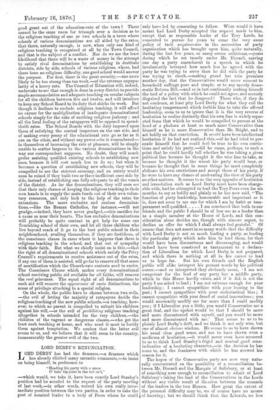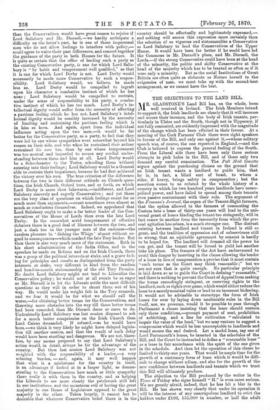LORD DERBY'S RENUNCIATION.
LORD DERBY has had the firmness,—a firmness which has already elicited many sarcastic comments,—to insist on being himself, in preference to
"Heading his party with a sense 0' bein' tip-joint in the tail on't,"
—which would, we take it, have been exactly Lord Stanley's position had he acceded to the request of the party meeting of last week,—in other words, waived his own really inter- mediate position between the two parties, in order to take the post of nominal leader to a body of Peers whom he could
only have led by consenting to follow. What would it have meant had Lord Derby accepted the request made to him, except that as responsible leader of the Tory Lords, he consented to pursue for years to come the very same policy of tacit acquiescence in the necessities of party organization which has brought upon him, quite naturally, during the last few years, so many severe criticisms, years during which he sat tamely under Mr. Disraeli, moving one day a party amendment in a speech in which he involuntarily betrayed how much less he agreed with the party he was trying to serve than he did with the party he was trying to check,—making grand but vain promises another day, that the Conservatives would never consent to household suffrage pure and simple, or to any merely demo- cratic Reform Bill,—and so in fact continually making himself the tool of a policy with which he could not agree, and scarcely disguised the fact that he disagreed ? Those who, if they do not condemn, at least pity Lord Derby for what they call the hesitating temperament which forbids him to take the offered leadership, seem to us to ignore that it is the very reverse of hesitation to realize distinctly that his own line is widely separ- ated from that which he would be compelled to pursue at the head of a phalanx at least as much more Conservative than himself as he is more Conservative than Mr. Bright, and to act boldly on that conviction. It would have been intellectual hesitation if he had not realized this,—if he had tried to per- suade himself that he could both be true to his own convic- tions and satisfy his party,—till he came, perhaps, to such a point that he could hardly tell whether he was taking a given political line because he thought it the wise line to take, or because he thought it the wisest his party would bear, or because he thought that in some things he must completely abdicate his own convictions and accept those of his party, if he were to have any chance of moderating the view of his party on other matters. It seems to us the very opposite of hesitation and irresolution such as Lord Derby must have been charge- able with, had ha attempted to lead the Tory Peers even for six months, to say as boldly and plainly as he has now said, " The function of party leadership, honourable and important as it is, does not seem to me one for which I am by habit or tem- perament well qualified I am convinced that both to our friends and the public I should be of less use as a leader than as a simple member of the House of Lords, and this con- sideration alone decides me, though with sincere regret, to decline an offer for which I shall always feel grateful." Of course that does not assert in so many words that the difficulty with Lord Derby is not so much leading a party, as leading the particular party which asks him to lead them, for that would have been discourteous and discouraging, and would indeed have been construed as tantamount to a declara- tion of Liberalism for which Lord Derby is not prepared, and which there is nothing at all in his career to lead us to hope for. But his own friends and the English public will alike interpret his present words by his political career,—and so interpreted they obviously mean, I am not competent for the lead of any party but a middle party, which in this House hardly exists, and if it did, is not the party I am asked to lead ; I am not extreme enough for your leadership ; I cannot sympathize with your leaning to the past ; I cannot sympathize with your ecclesiastical bias ; I cannot sympathize with your dread of social innovations ; you would necessarily modify me far more than I could modify you ; if I Liberalize you a little, you would Conservatize me a great deal, and the upshot would be that I should be more and more discontented with myself, and you would be more and more discontented with me.' That seems to us to be plainly Lord Derby's drift, and we think it not only wise, but one of almost obvious wisdom. He seems to us to have shown his usual clear good sense, and not to have shown even a modicum of hesitation,—it would never even have occurred to us to think Lord Stanley's frigid and neutral good sense indicative of a hesitating character,—in the decision he has come to, and the frankness with which he has avowed his reason for it.
The hopes of the Conservative party are now very natu- rally concentrated on the possibility of a reconciliation be- tween Mr. Disraeli and the Marquis of Salisbury, or at least of something near enough to reconciliation to admit of Lord Salisbury's taking the lead of the Conservatives in the Lords without any visible result of disunion between the counsels of the leaders in the two Houses. How great the extent of the personal difficulty may be, we of course have no means of knowing ; but we should think that the Liberals, no less than the Conservatives, would have great reason to rejoice if Lord Salisbury and Mr. Disraeli,—we hardly anticipate a difficulty on the latter's part, he is one of those impersonal men who do not allow feelings to interfere with policy,— could agree to waive their past differences, and concert together the guidance of the party in both Houses for the future. It is quite as certain that the office of leading such a party as the existing Conservative party, is one for which Lord Salis- bury is " by habit and temperament well qualified," as that it is one for which Lord Derby is not. Lord Derby would necessarily be made more Conservative by such a respon- sibility. Lord Salisbury would, we believe, be made less so. Lord Derby would be compelled to ingraft upon his character a combative instinct of which he has none ; Lord Salisbury would be compelled to restrain, under the sense of responsibility to his party, a comba- tive instinct of which he has too much. Lord Derby's in- tellectual dignity would suffer from the necessity of affecting a partizan feeling which he has not, Lord Salisbury's intel- lectual dignity would be sensibly increased by the necessity of limiting and restraining the partizan feeling which is in him so keen. And again, apart from the individual influence acting upon the two men,—it would be far better for the Conservative party, as a party, to feel that they were led by one whose sympathies went somewhat beyond his reason on their side, and who when he restrained their ardour restrained his own too, than by one whose temperament was too neutral and impartial to secure any cordial under- standing between them and him at all. Lord Derby would be a Schoolmaster to the Tories, schooling them without entering into their feelings ; Lord Salisbury would be a General able to restrain their impatience, because he had first achieved the victory over his own. The true criterion of the difference between the two is their different attitude on Church ques- tions, the Irish Church, Oxford tests, and so forth, on which Lord Derby is more than lukewarm,—indifferent, and Lord Salisbury sincerely and eagerly Conservative ; and yet these are the very class of questions on which feelings count for so much more than arguments,--count sometimes even almost as much as conclusions themselves. Indeed, we apprehend that Lord Salisbury ought to make a far better leader of the Con- servatives of the House of Lords than even the late Lord Derby. In the somewhat acrid temperament of effective debaters there is a good deal of likeness between the two, and just a dash too in the younger man of the rashness—the careless pleasure in dishing the Whigs ' almost without re- gard to consequences—which marked the late Tory leader. But then there is also very much more of the statesman. Both in his short administration of the India Office, and in the speeches he made on Reform and on the Irish Church, there was a grasp of the political interests at stake, and a grave feel- ing for principles and results as distinguished from the party interests at stake, very different in kind from the random and hand-to-mouth statesmanship of the old Tory Premier. No doubt Lord Salisbury might not tend to Liberalize the Conservative policy ; he would not at all events be as eager as Mr. Disraeli is to let the Liberals settle the most difficult questions as they will in order to shunt them out of his way. He would make his weight felt in the Tory counsels, and we fear it would be for what we should call the worse,—for obtaining better terms for the Conservatives, and throwing more obstacles into the way till those better terms had been conceded, than Mr. Disraeli dares or cares to do. Undoubtedly Lord Salisbury was last session disposed to ask for a much better compromise on the Irish Church than Lord Cairns demanded. If refused,—as he would have been,—we think it very likely he might have delayed legisla- tion till another session, and that the result of such delay would have been startling and dangerous. We are not, there- fore, by any means prepared to say that Lord Salisbury's action would, in detail, always be for the advantage of the country. But then last session Lord Salisbury was not weighted with the responsibility of a leader,--a very sobering burden, — and, again, it may well happen that what is a misfortune for the country in itself, is an advantage if looked at in a larger light, as demon- strating to the Conservatives how much or little sympathy there really is with them in the country, and as helping the Liberals to see more clearly the patchwork still left in our institutions, and the monstrous evil of having the great majority in one House of Legislature opposed to the great majority in the other. Taken largely, it cannot but be desirable that whatever Conservative belief there is in the country should be effectually and legitimately expressed,— and nothing will secure this expression more certainly than the selection of so vigorous and statesmanlike a Conservative as Lord Salisbury to lead the Conservatives of the Upper House. It would have been far better if he could have led the Commons in Mr. Disraeli's place, and Mr. Disraeli, the- Lords,—if the strong Conservative could have been at the head of the minority, the politic and shifty Conservative at the- head of the majority which has to be treated so often as if it were only a minority. But as the social Institutions of Great. Britain are often quite as obdurate as Nature herself to the- exigencies of man, we must take up with the second-best arrangement, as we cannot have the best.



































 Previous page
Previous page